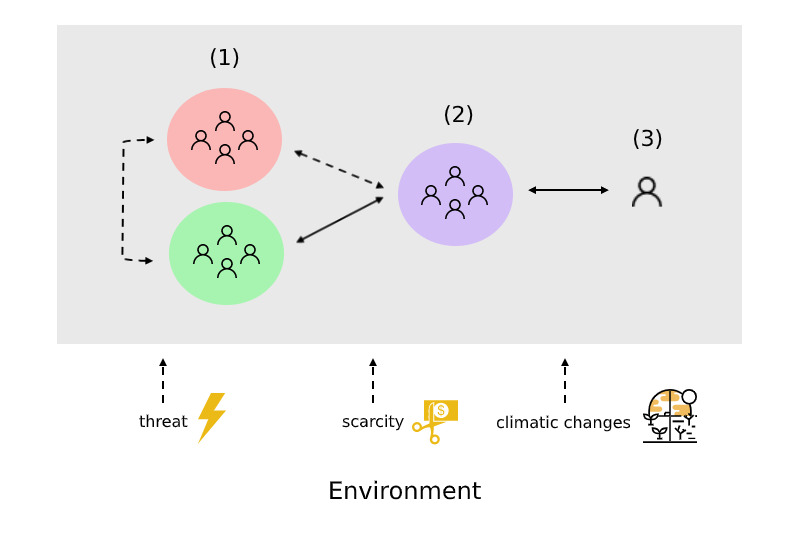Groups are collections of three or more people whose decisions shape their own and others’ welfare and well-being. Moreover, groups exist next to other groups and intergroup interactions influence, substantially sometimes, individual welfare and well-being as well. We are interested in how individual thoughts, feelings and decisions influence, and are influenced by, interactions within and between groups.
Our research is centered around the following themes: Cooperation and conflict between groups (1), parochial cooperation (2), and individual factors underlying these processes (3) in the context of environmental challenges (such as threat, economic scarcity, and climatic changes).
Among the key threats to human societies are intergroup conflicts. Our work, and that of others, finds that the emergence and escalation of conflicts between groups of people is closely linked to parochial cooperation: Intergroup conflict motivates parochialism within groups, and parochialism within groups polarizes intergroup relations. We investigate how conflict is defined by macro-level factors such as scarcity in resources or climate-related changes which exert pressure on co-existing groups.
We investigate these questions using time-series analyses in order to link climatic and economically stressful times in the human history and how they shaped conflict between groups across time. We also use lab experiments in which we manipulate different factors such as scarcity or innovation options to understand how different environmental circumstances increase or decline conflict.
Current projects:
- How different countries vary in their attack and defense propensities as a function of regional socio-economic, political and climatic differences?
- Does environmental uncertainty create parochialism and intergroup conflict?
- Does the presence of innovation option reduce conflict?
Representative publications:
- Human groups respond to unpredictable environments with conflict (in prep)
- De Dreu, C.K.W. & Gross, J. (2019). Asymmetric conflict: structures, strategies and settlement. Behavioral and Brain Sciences 42: e145
- De Dreu C.K.W., Gross J.A.J., Méder Z.Z., Giffin M.R., Prochazkova E., Krikeb J. & Columbus S. (2016), In-group defense, out-group aggression, and coordination failures in intergroup conflict, Proceedings of the National Academy of Sciences of the United States of America 113(38): 10524-10529.
Humans have a remarkable capacity for cooperation among genetically unrelated individuals. Cooperation is, however, often bounded to members of particular groups and such groups endogenously form or break apart. We ask how parochial cooperation emerges through indirect reciprocity, reputation heuristics, and partner selection. We also ask how outside conditions, such as external threat and wealth disparities within groups affect the rise and fall of cooperation and conflict.
To answer these questions, we use behavioral group experiments and game-theory approach.
Current projects:
- Does threat influences selfish or pro-social behavior within a group?
Representative publications:
- Gross J. & De Dreu C.K.W. (2019), Individual solutions to shared problems create a modern tragedy of the commons, Science Advances 5(4): e7296.
- Gross J.A.J. & De Dreu C.K.W. (2019), The rise and fall of cooperation through reputation and group polarization, Nature Communications 10: e776.
- Molenmaker W.E., De Kwaadsteniet E.W. & Van Dijk E. (2019). The effect of decision timing on the willingness to costly reward cooperation and punish noncooperation: sanctioning the past, the present, or the future. Journal of Behavioral Decision Making 32(3):242-254
Peaceful co-existence among individuals and groups breaks down when participants try to exploit others, forcing these others to protect themselves against exploitation. Examples of such “predator-prey” encounters include interactions among thieves and house-owners, among terrorists and security personnel, or among prosecutor and defense attorney. Using an experimental model of attack and defense we examine the neural, psychological and strategic aspects of predatory aggression and prey-defense.
We answer these questions using a behavioral, hormonal, psychological measurements in a context of an attacker-defender task. We also investigate neurocomputational models of conflict.
Current projects:
- Psychophysiological correlates of in-group favoritism and out-group spite under uncertainty
- (Neuro-)computational models of (attacker-defender) conflicts
Representative publications:
- Rojek-Giffin, M., Lebreton, M., Scholte, H.S., van Winden, F., Ridderikhof, K.R., De Dreu, C.K.W. (2020). Neurocognitive underpinnings of aggressive predation in economic contests. J Cogn Neurosci (in press)
- De Dreu C.K.W. & Gross J. (2019), Revisiting the form and function of conflict: Neurobiological, psychological, and cultural mechanisms for attack and defense within and between groups, Behavioral and Brain Sciences 42: e116.
- Zhang H., Gross J.A.J., De Dreu C.K.W. & Ma Y. (2019), Oxytocin promotes coordinated out-group attack during intergroup conflict in humans, eLife 8: e40698.
Part of our research is funded by the European Research Council (ERC). Learn more about this research here:
